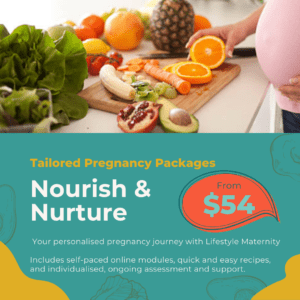Congratulations! You’re embarking on an incredible journey of pregnancy. Amidst the excitement, there’s also a whirlwind of information (and sometimes misinformation) about what to do (and not do) to ensure a healthy pregnancy.
Nutrition plays a crucial role, and navigating myths surrounding supplements, morning sickness, and food choices can feel overwhelming.
Last month we looked at the myths of ‘eating for two’, pregnancy food cravings and weight gain in pregnancy. This month let’s debunk three more myths so you can feel empowered to make informed choices about nourishing yourself and your growing baby.
Myth #1: Pregnancy Vitamins Guarantee All Your Nutritional Needs
Despite a strong marketing push, pregnancy multivitamins (or the “pink” multivitamins) are not required by most women.
There are only two essential nutrients recommended for pregnancy:
- folic acid, crucial for reducing the chance of neural tube defects in your baby, and
- iodine, for growth and development, especially of baby’s brain.
Other nutrient supplements that may be required if a deficiency is diagnosed (iron, vitamin D, vitamin B12), someone is at risk of pre-eclampsia (calcium) or women avoid certain food groups, such as vegetarians or vegans (iron, vitamin B12).
Remember: A well planned and balanced diet is the foundation of a healthy pregnancy. A food first approach is best for most nutrients needed.
Dietary supplements play a specific and supporting role, rather than acting as an insurance policy “just in case”.
Myth #2: Morning Sickness Means You Can’t Eat (or You Have to Eat Bland Foods Only)
Morning sickness, though often referred to as such, can strike any time of day. Feeling nauseated can make the thought of food unappealing, but avoiding food can actually worsen the symptoms.
Taming the Tummy Troubles:
- Small and Frequent Meals: Opt for smaller, more frequent meals throughout the day to avoid an empty stomach.
- Find Your Triggers: Identify foods that worsen your nausea and avoid them temporarily.
- Hydration is Key: Stay hydrated by sipping water or clear fluids throughout the day. Ginger tea may also help soothe nausea.
- Bland Doesn’t Have to Be Boring: Bland foods like crackers or toast can be your lifesaver, initially. But explore other easily digestible options like crunchy dried breakfast cereals, yoghurt, fruit smoothies, or mashed potatoes.
Don’t Fear Flavour:
While some bland foods might be comforting initially, don’t feel limited. Experiment with different flavours and textures that appeal to you. Ginger, peppermint, and citrus can sometimes help settle your stomach.
Myth #3: There’s a Long List of “Forbidden Foods” During Pregnancy
Sometimes it can feel like the list of foods to avoid in pregnancy is longer that what you are allowed to eat. Due to changes in a woman’s immune system during pregnancy, you are more susceptible to food poisoning.
This is from the usual culprits – Salmonella, E.coli and Campylobacter – but also one you hear a lot about in pregnancy, Listeria.
However, if you avoid all foods that carry a risk for harbouring listeria, it is likely that you will consume fewer nutrients. This is not ideal as you ARE growing a baby.
You don’t have to go without! For every item on the “no” list, there are a number of alternative and this table will help to make those choices (source).
| Foods to avoid | Safe alternatives to enjoy |
| · Deli meats
· Pre-sliced and pre-packaged meats · Cold ready to eat chicken |
· Meats cooked at home
· Tinned fish (two to three times per week) · BBQ chickens, if eaten immediately when hot |
| · Chilled or raw seafood
· Sashimi or sushi · Smoked salmon (or other smoked fish varieties) · Oysters · Pre-cooked shellfish including prawns and crabs |
· Tinned fish including salmon and tuna (two to three times per week)
· Freshly cooked seafood, including shellfish, eaten hot |
| · Pre-packaged or pre-cut fruit, vegetables and salads
· Salad and sandwich bars · Buffets |
· Homemade salads with freshly washed ingredients
· Freshly cut and washed fruit · Canned or frozen fruit and vegetables |
| · Soft cheese including brie, camembert, ricotta, feta and blue cheese
· Pate or meat spreads |
· Hard cheeses such as cheddar
· Processed cheese · Cream cheese spreads · Plain cottage cheese · Soft cheeses that are cooked and eaten when hot |
Freedom with Responsibility:
Beyond these exceptions, you can enjoy a variety of foods during pregnancy.
Here’s what to prioritise for a healthy pregnancy diet:
- Fruits and Vegetables: Aim for a rainbow! They provide essential vitamins, minerals, and fibre.
- Whole Grains: Choose wholegrain bread, low GI brown rice, quinoa, and oats for sustained energy and healthy digestion.
- Lean Proteins: Include protein sources like chicken, fish (excluding mercury-rich varieties), beans, lentils, and tofu for building and repairing tissues and supporting your baby’s growth.
- Healthy Fats: Don’t fear healthy fats found in avocados, nuts, seeds, and olive oil. These are essential for fetal brain and eye development.
NEED MORE HELP?
We offer individual consultations and self-paced online courses as we know you all have different learning styles and budgets. Attending an individual session OR online course with a Lifestyle Maternity dietitian will allow you to assess your diet against recommended guidelines and identify changes that can be tailored to your lifestyle and dietary preferences.
In our self-paced online course you will be encouraged and guided to assess your own health habits against pregnancy recommendations, participate in activities around setting health goals for optimal nutrition and learn how to adapt your routines with confidence to achieve these goals to make them stick. More information here.
An individual consult involves a more thorough assessment of your dietary and lifestyle patterns with a personalised action plan being developed in collaboration with the dietitian. If you would like further information book an appointment now.

IMAGE CREDIT: Olena Sergienko, Unsplash
IMAGE DESCRIPTION: Pink mug with a yellow tag on a tea bag.



 Find us on
Find us on